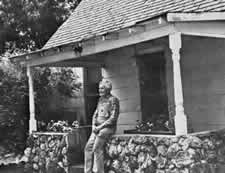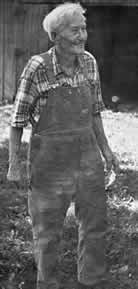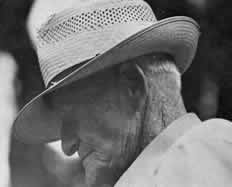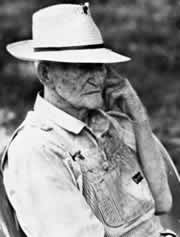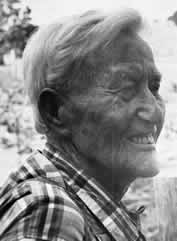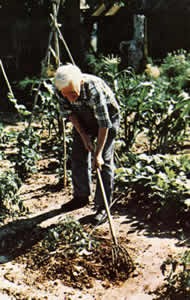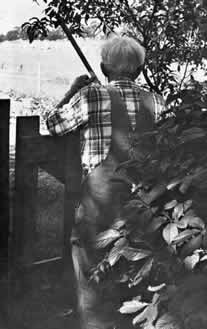 |
Volume III, No. 2, Winter 1975 |
CHANGE MY LIFE?
NO, I MIGHT DO WORSE
VISITS WITH CHARLIE GRACE
Edited by Jenny Kelso
Interviews by Doug Sharp, Jenny Kelso and Suzanne Carr
Photographs by Doug Sharp
"Come in. Let's go back to the kitchen where the light's better and sit around the table," Charlie Grace always greeted us. "My eyesight's never been good and we can see out here." In spite of his eyesight and his difficulty hearing, it is hard to believe he is ninety-one years old. Always dressed in overalls and a plaid shirt, he looks the lifelong farmer he is. His son farms his acreage now and has the last several years, but Charlie still knows every bump and rock on his 160 acres.
He loves to get out and spends as much time as he can in his garden. "My children don't like me to come out here much." As he was hoeing his beans, he warned us, "Be sure and let me know if I'm hitting the plant instead of the weed!"
Charlie was a little shy at first and somewhat overwhelmed by the five of us eagerly listening and taping every word and taking roll after roll of pictures, but he always was disappointed when we had to leave. Once, after we visited him, he was sick for several days. We hoped it wasn't from our visit. "Oh no," he hastened to assure us. "I think I just ate something. But, if it makes you come back to visit me, it'll be worth getting sick again."
On all our visits with Charlie, he was most emphatic about religion and seemed rather proud of his independent views about religion and about churches.
I belong to a church but I don't belong to a church organization down here. I've had a little different views on religion than a lot of people. I went to church here, and there was a lot of times the preachers here urged me to join, and I said, "I think whenever you become a child of God, you belong to Christ's church already, and I don't see any reason of joining anywhere else." And I never did. I joined the Baptist Church when I was eleven and was baptized in Muddy Creek, and they had to cut the ice so that wasn't very nice either. But I didn't catch a cold.
I believe God is beyond understanding, and the Bible even tells us he is. As for what you should do, I think your conscious ought to be a pretty good guide, if you really go by it.
Now the first few chapters of the Bible don't give us a very big knowledge of the beginning. But then we never did think so much about that until the last quarter century--until all these schools started teaching this scientific stuff. It caused a lot of young people to not believe in the Bible, because they thought that the scientists have found things that are millions of years old, and all that couldn't be. But don't you think that if they believe any of it and believe that God created the world that He could of made a rock look that old just as well as He could have made any of the others?
He had to make everything that was made for it said everything was created by Him. But all the Bible tells us about it is that in the beginning it was void and that He separated the land and water.
[36]
In them days they was a-telling us about, there was already something there. That earth was there or he couldn't of separated it. And he separated the darkness and the light and made the nights and days. We don't know how long that creation was, either.
I don't know how you believe, but I believe Christ is the only gateway to heaven. If you believe in Christ, you are already destined for heaven, that's it!
A preacher on TV the other day was going to tell us what belief means. Now what does he know about belief anymore than we do? You know whether you believe something or not, just as well as he does. I think preachers add to the Bible sometimes. I don't think this preacher means to, but I think that he is adding to it when he goes to telling you've got to do this and you've got to do something else. But christ said, "If you believe on me, you shall not perish but have everlasting life." And I'd rather take Christ's word for it than that preacher. I have always been that way regardless who the preacher is and where he is.
I never could believe very much in public prayer. They go to the TV and every sermon you listen to them pray to God, but they go to the microphone to pray to God. Well, they are praying to people, aren't they? If they are not a-praying to people, why do they use the microphones? The Bible plainly tells them that the Pharisees liked to get up and pray to be heard, but He told them not to do that, didn't He, but to go into their closets and pray in secret and He would answer them. The people that preach today don't believe that least they don't practice it. I don't accuse any of them or any I have heard on TV. I think it would be all right to talk and tell what they want the church to do and so on, but this preacher prays before they even take up the collection, and he prays again for that. It may help because they get the biggest collection there than any church I know. There is never a Sunday morning but what they have $10,000 or more Sunday School collections!
But I always liked it here and I always stayed.
I had a cousin that used to live in Kansas City and he said they hire singers to sing--that a church had to be carried on that way. I said that would be fine and then they ought to hire their listeners, too. They deserve pay just as well as the others! I don't call it worshipping God if you have to be paid to do it. But there is going to come a day when all of this is not going to amount to much to any of us, anyway.
My family is far more important to me than any of this stuff anyway. My wife and I, we lived about, oh, ten, twelve miles apart back before we were married. She would be up in our neighborhood a-visiting once in a while and it just happened on one Sunday that she came home from church with a cousin of mine. I went there the same Sunday she was. And it happened that when we went back to church that night, we went back together, and I don't know, I guess from then on I kept going with her. Our seventieth anniversary was in March before she died in September.
Well, of course, I knew her family, but I just never did get acquainted with her until this day, but after that, I expect it was over a year before we married. We were both twenty. She was about four or five months older than me. We were both from large families.
When I got married in 1904, I had seventy-five dollars and I thought I was awful lucky to have that. Oh, I also had my team and a few little farm tools--plow and wagon. I was up in the northwest part of this state where we had bought a farm, but I didn't have anything to pay on it. I bought it on time. It was just a forty acre farm, and we only lived on it one year. Then we went and rented bigger places.
[37]
It's a good deal what my old uncle used to say. It don't make any difference how much you make, if you spend just a little less than what you make, you will get along. But I don't care how much you make, if you spend more than you make, you are going to go broke.
My folks give me a dozen chickens and a cow. That helped out, of course a little, but there we were. We had to live for a year before our crops were ready to raise. I don't see myself how people got along, but we always lived. Always had something on the table. But I just thought now, what in the world would people do today if they didn't have outside jobs--living on a farm and back like it was in them kind of times?
I've been a farmer all my life. Times were hard back them times, too. Then in 1905 our oldest son was born and in the fall of 1906 we rented a farm--paid cash rent--and it just took all the crop that I raised to pay the rent. I said, "I'll go to work out." I sold off all the stuff I had and I went and for thirty-five dollars a month I worked out for a year. That didn't suit me very good, either. So we come back and rented a place for two years and then we bought it, sold it at a little profit and bought another one. I kept the last one six years, then the price come up and I doubled my money. Then I came down here to south Missouri in 1920 and bought this farm, the same size place for just the profit I had made on the other one. That's how I happened to come to this country, just to get out of debt. But I always liked it here and I stayed. When I bought this farm I paid for it, and therefore it was home. And my wife said, "We'll keep it." And we did.
I sometimes feel I have accomplished very little in my life, But, well, I have a family. We have had eight children, seven of them are still living. They are all healthy and got good homes of their own. Therefore, I feel very thankful for all that. I have tried to be a help to them.
There isn't a great burden in raising eight children. You are always broke, but you have to spend your money on something, anyway. It is a good deal what my old uncle used to say--he lived here right by us. "It don't make any difference how much you make, if you spend just a little less than what you make, you will get along. But I don't care how much you make, if you spend more than you make, you are going to go broke." And I think that's kind of like it is in life. I don't think that most people with big families in reality get along much worse than others. Naturally you would say they had to have a harder time, but at least they don't seem to suffer for it anymore than the ones that don't.
I don't think I ever did try to influence any of my children in what to do, except Mary, and she didn't do it anyway.
[38]
But I do think it's important for a parent to help get their child started. My father had eleven children and if I couldn't have got his name on the paper, I could never have bought my first farm at all. I guess it would be all right for them to do it on their own, if they had a way to do it, but there isn't very seldom anyone who could buy a farm without their parents.
I need other people to help me. I found that out very young when I needed friends. I think a true friend would stay by you, I think about any kind of trouble you get into. He might not approve of what you do, but he couldn't help but do his best to get you out anyhow. He'd be a true friend. I believe I've had friends that's go out of the way to protect me.
I ran away when I was fifteen years old. There was eleven of us children. I had five brothers and five sisters and I didn't have any grudges with my father or mother nor with the children, but I thought I could do better alone. I found out afterwards that I'd made a big mistake. But I met a man that I went to working with out there. He was about ten years older than me. He was a married man and he just kind of took me under his arm and just kept me and protected me. But I always thought now, a fellow like that was surely a true friend. We'd be into tough joints where they was tough people and all that. He always told them that they were not to bother me. And his word always seemed to go. A fellow like that you couldn't say had any reason for it. Later on, oh, I guess six or seven years after that, after I was married, I moved out where he was a-working and got a job. We were just about a mile apart again. He never did forget me. And I always trusted him.
You can't be sure of trusting anybody, but you should put trust in most anybody unless you get some reason to distrust them, don't you think so? But now there is difference in people that-a-way. They can't help it. You know there's people that distrust everybody so that you have to prove yourself honest before they'll trust you.
When I moved to this country from north Missouri, I hadn't been here but a little bit till I bought some sheep. I was just new to the country and didn't know anyone and this fellow wanted to sell me these sheep. I didn't have enough money to pay for them right then.
"Well," he said, "you go ahead and buy these sheep." He priced them to me cheap enough. "And you can just pay me for them when you get ready." I said, "No, I wouldn't want to do that." He said, "All I'd ask is that I just take your note for it." Well, he just talked around and he finally talked me into it.
I bought the sheep right on home and the next day I met him up here in town and I supposed he'd want me to go in and sign a bank note, but he said, "Now right in here they have paper." He went into one of them restaurants there and picked out the tablet and just wrote on it that I promised to pay and had me sign my name to it. He said, "That's as good as any other note to me," and stuck it in his pocket. I've often thought of him after that. Ain't very many people'd put a trust in a stranger that had just got to the country and he didn't know nothing about me. He said, "I just thought that I had a cousin and he said the churches hired singers to sing, that a church had to be carried on that way. I said that be fine and then they ought to hire their listeners, too. They deserve pay just as well as the others! I don't call it worshipping God if you got to be paid to do it.
Our seventieth anniversary was in March before she died in August. That's a long time together, but it seems like it has been pretty near that long since.
I had pretty good judgment of people." So he was willing to trust me. I've always believed that most people are basically good and want to help you, don't you?
[39]
Once I saw a man step in to help in a dangerous place that took some bravery. It's hard to say about bravery for there are just little things that come up about it that a man don't know what he would do. Did you ever know Vic Jeffries' dad? I guess you didn't. I was up here at town one time when a policeman went to arrest another man by pulling a gun on him. There was a crowd that was right along on the sidewalk in front of the store there. We seen the crowd gather there and went up there. The policeman said, "Now I don't want to shoot you."
This fellow said, "You won't shoot nobody," and grabbed the policeman's gun. They scaffled over it and the gun went off and shot a boy right through the arm. This Mr. Jeffries was a-standing there. He just ran in and took that gun away from them fellows. He's a preacher and he was just a-standing on the street and seen this. He said afterwards, "I never even thought about being afraid till I got out there and done it, and after I did, my knees just wouldn't hold me." He went in there to protect somebody else. There was a crowd around there and they was a-fighting over a hand gun. I was there and saw it, but I didn't rush in. I guess I ain't as brave as he was.
I never went much to school. When I was about twelve or thirteen I had--well, we called it granulated lids--and I've had them ever since. I just about lost one eye then--I can see a little bit out of it yet--but I never did see good after that. I was nearsighted, and I doctored for nine months then. I never did go to school anymore. But the time I went to school I attended Lone Star. It was just a little village. It had a store and two churches, and four or five families lived there. No doubt I didn't have enough education. I think I've had as much education since I was out of school than I ever did in it.
I"ve always felt education was a good thing. Of course, back in them days there were not very many country people up in our part of the country anyway, that ever got farther than the eighth grade because they wasn't very many of the country folks that was able, or thought they were able, to send their kids on to high school. And they were lots of the people that didn't want to send them on. They didn't think it made any difference. They thought because they made it without an education it'd always be that way. I think it's always been valuable, and now not only is it valuable, I think it absolutely necessary if you aim to make a living.
I don't believe children learn any faster in school now than they always did. I was on the school board for years after I came here, but I guess there's nothing new about that. If anybody moves in a new neighborhood, why, they're on the school board! But I had a large family of my own and I've got a large number of grandchildren and I think most of them do as well as anyone else in school, but at the same time I don't think they get along any faster than their parents did.
[40]
There have been a lot of changes in school since I last attended. When I was a school boy they hired the teacher and the teacher done the janitor work. The first money I ever made was a nickel a day for sweeping the floor at school.
The teacher would hire me and when wintertime came I built the fire. That way, of course, it was never the school--the teacher would have to do that. Teachers was plentiful and jobs was scarce and they'd say, "We'll take it."
I went to school where we had eighty scholars and one teacher. Then there were just a few of the best teachers, the highest paid teachers would get up to forty, fifty dollars a month. My oldest brother was a teacher and I don't think he ever got over fifty a month.
I think the most important thing you could teach in school would be reading and writing and arithmetic. I think that is the most important right now. They got to have that, looks to me like, before they can get any of the rest. I've known a few men that couldn't even read nor sign their name that come to be pretty well known people. They done all their figuring in their head and any ordinary deal they could figure it up as quick as you could take a pencil and find it out. But they didn't know anything about books cause they never been taught them. You don't see very much of that anymore.
I've heard--I don't know about schools, though my daughter is a teacher and she's always taught the lower grades--I've heard that methods have changed and reasons have changed. I've got a grandchild. He's a teacher and he's also been working in colleges. I said, "They don't teach measurements like they used to or anything like that." And he said, "You don't need it." And I said, "Well, I don't see why you wouldn't need it. I am still old-fashioned to think that if I go out there and buy a piece of land, I want to know how many feet it takes to make a rod and how many rods it takes to make an acre and all that stuff." He said, "They don't teach that."
Well, now they're talking about metrics. They are teaching all that, and we haven't changed over to that method here yet. They are going to teach everybody that method, I guess, and have them ready for it. What good reason would there be for changing to metrics? I don't see a very good reason for patterning after the other parts of the world. Let them follow us if they want.I've seen a lot of other changes in my life time. Grover Cleveland was the first president that I can remember. There is not a lot of difference between all the presidents which I remember. The biggest difference is only when they are running. They say Hoover had a bad break when he was in there. Things went awful bad, but I don't know if he is to blame for it. It just happened that way. I was always a Democrat. Hoover is the only Republican I voted for. Now I think Truman was a pretty lucky man. There was a lot of things about him I didn't like. He was such a rough talker was one thing I didn't like about him. It looks to me like that a fellow belittles himself when he gets up on TV and talks and swears out, and it does to me yet anywhere. That's one thing I never could understand. I worked on ranches, but I never could understand. There was some young fellows that swore every breath. I worked for a fellow one time that he never hardly ever said a word without swearing. But he would never swear before a woman, so you knew he could of helped from swearing if he wanted to. Nor he would never swear before his dad. He was a fine fellow, as far at that's concerned in every other way. But he just had that habit.
I think there's lot of things need changing about our government, but I really don't think there'll be any change only as things get beyond their control and they have to make changes. Our government has failed to be by the people and for the people. That's what is said in the Constitution. But it's by the politicans and for the politican now and not for the people. You take your government today and they talk about giving to poor nations, but they don't give to the poor in the poor nations. They give to the leaders over there and the poor gets on very little of it, if any.
I don't know that we're very much better off now than the communist already. They got pretty near as much control of us as they have there. Here people always talk so bad about them, but on the other hand, the rich people over there gets along pretty good and that's the same way it is over here. It just looks to me like our government has got our country in--I don't mean the President, but Congress and all--has got it in such a shape, that it looks to me like we are liable to go most any way. And when I look at the world's condition, I don't see nothing yet that hasn't already been prophesied it will come, so it's coming anyhow.
[41]
I can't look back and say that it was the good old days back in our time. In some ways I believe people did live happier than in other ways, but they had a hard way of earning a living them, too. So I really can't say that the times have changed a whole lot except that there's more people. I don't see any way in the world how the future can get better. I think our government now has tried to make it better, but man has been a failure ever since he started and everything they go into turns out to be worse, and it's been that-a-way ever since I can remember. Of course, I read the scriptures quite a little and it's just the way it was predicted from a way back there in the first that it would--these times would come and we can see that they are.
One of the harder times for me was the depression. I remember it was pretty bad. I guess it was in 1931 or '32 when the depression was the worst. I don't know how my family overcame it. Well, course we were just like everybody else. We loaded our produce and sold door to door. And then in 1934, to add on to this depression we had the worst drought this country's ever known. There was no feed raised here. I had forty acres in corn and did not even have a roasting ear that year. We cut our corn and in the year of 1934 it had just grown up about waist high, that's as high as it ever did get. We cut that corn, and just lay it down in arm fulls of it in the morning. And by evening we would go out and load that in a trailer and get it in the hay barn just like you would hay. We cut that corn and it didn't fill the hay loft half full. But we did have a patch of cane that we had sowed. It lived, and after the fall rains came, it commenced to growing up. But we sold all of our stuff that year but ten head of young cattle. It didn't take as much to feed them. And we just lived.
One thing hurts in a depression so bad is when things went to booming, there was so many people that wanted to get rich. They took mortgages on their land they already had to buy more. And for years after that here you couldn't of sold that and got half what you gave for it. But I never wanted to sell, so it never did affect mine. But the farm that I sold up in North Missouri, I got $120 an acre for it when I sold it. And there was several times during the depression they wrote me offering me that land back for fifty an acre! It was a good place, and I suppose by now, like land here it's went up to where it's valuable again.
Our first problem started just after World War I when things began to boom. I can remember well. I was raised in the same neighborhood where I lived then and I knew them farmers. Nearly all the older farmers owned their farms. But when things began to boom, there was any amount of them that bought farms, either just to enlarge or bought for their children. And there was nine out of ten of them that lost their land. I had one brother that kept on buying all this high priced stuff. He said, "It can't never go back again. Can't now, no. You will never see these cheap times again." But he saw them and we saw them pretty quick. And it just about cleaned him out, too.
Our government has failed to be by the people and for the people. That's what is said in the Constitution. But it's by the politican and for the politician now and not for the people.
[42]
That's what I've told them all along about this one now. And to some extent it has been that-a-way. Of course, it's nothing now like it was then. You take cattle. Cattle is still pretty high, but they have went down to where there is no profit in them. We sold several cows right here that didn't bring half as much as they did two or three years ago. Now that's quite a drop. And somehow they could keep a-holding on. But farmers that got them have to take the loss. Now they can take the loss, so it don't hurt the ones that got them as bad as it hurt the poor ones back in those days.
Even though the depression was rough on me, in a way I'd have to admit I've been successful in getting by this far anyway, and I got everything, I guess, that I dreamed of, so I think that would be getting success. I ain't been no big success if it means getting out and making wealth. I don't believe money can make a person happy, but it can come in pretty handy a lot of times. What would make me more happy than to have a lot of money would be able to get along with everybody in the neighborhood and be friendly and see things a-going right. That's make me a lot happier than it would just making another dollar and putting it in the bank.
A man that used to live down at Brush Creek here said his father and mother back before Roosevelt's day when he guaranteed the banks, he said they just saved until they had about seven or eight hundred dollars in the bank, and the bank went busted. He said they'd been laying this money up--they didn't make much--just a-saving a little at a time until they got a few hundred dollars ahead there. When the bank went busted they only got paid back about five cents on the dollar. And oh, he said, they was just worried to death over it. He told them, "Now there's not a bit of use for you to take on about it. You still got them papers and that's all the good it ever done you anyway, so just leave them there and go ahead adding on to them." That wasn't very good logic, but it was about the truth as far as people is concerned. The money you lay away might give you a little pleasure to know that in case of emergency that you'd have it to keep you going, and I think it is a smart thing to do, but on the other hand, as long as you don't use it, it'll not do you any good.
I don't see too good, so be sure and let me know if I'm hitting the plant instead of the weed.
[43]
I'd think a person would be a success if he was industrious and even though he can't make a lot of money, if he can make a living and amount to something in the neighborhood, I believe he is successful. When I was married, I didn't have anything and that held on for several years that I just had a hard time just keeping even, but I never met a time but what we did keep even, because when we didn't make much we didn't use much. But we got along, I guess, and had just as much happiness then as we did after we made some money. I guess my life is about like everybody else's. There's been ups and downs, but I can't think of any period of life that was much better. Of course the last--after my wife lost her health--has been the worst period in my life. We were tied down and she was, too. My grandchildren remind me of her. Our seventieth anniversary was in March before she died in September. That's a long time together, but it seems like it has been pretty nears that long since.
I don't think people have changed much in my life time. Oh, they change in ways now, but you live together and work together and play together, and you go in some other neighborhood everything might be a little different in a way, but they all look on life about the same.
I never did believe that everybody's bad. I know I've seen some people that think everybody's had anything to do with you, they had a motive--they were trying to get you or something. I hear people talk that-a-way now. Well, just look over the country, they'd have to be good. If they wasn't there'd be more meanness than than what there is. And I'm afraid that these boys that does get off and doing bad --these teenagers that get caught for housebreaking and stealing and everything of the kind--a lot of that is caused, I believe, by neglect of their parents. They just haven't been looked after and been brought up. They see life--and there are others that see it--that the world owes them a living, and they don't care whether they get it off of you or somebody else, just so they get it.
I think a person should just be honest and true to convictions and always try to be a help to others, and I don't know what better advice I could give anybody to lead a good life than that. Because I think you get more enjoyment out of helping others, than you could out of any other part of life.
I don't think I've lived my life to the fullest. Do you believe anybody has? You may say that about lots of people. They may write them up that they think they've lived life to the fullest, but I don't believe anybody has. I believe we've all done things we wished we hadn't done. I don't believe you'd call that living your life to the fullest. I'm just like other people. I go on day by day. When you've got your health you do, and it's just kind of human nature to follow the crowd. So that's one thing you've got to watch yourself. You might follow them too far.
I expect there is a lot of things in my life that need a-changing. But really I don't know if I would change any of it. I might do worse.
I've had a long life and figure that death is something that comes to all of us. I expect I feel a little different about it than what younger folks do because I figure that I've already lived my time. I don't care to die. I believe in a hereafter. I happen to believe in the Bible.
[44]
Opposite page - Well, I expect there is a lot of things in my life that need a-changing. But really I don't know if I would change any of it. I might do worse.
[45]
Copyright © 1981 BITTERSWEET, INC.
Next Article | Table of Contents | Other Issues
